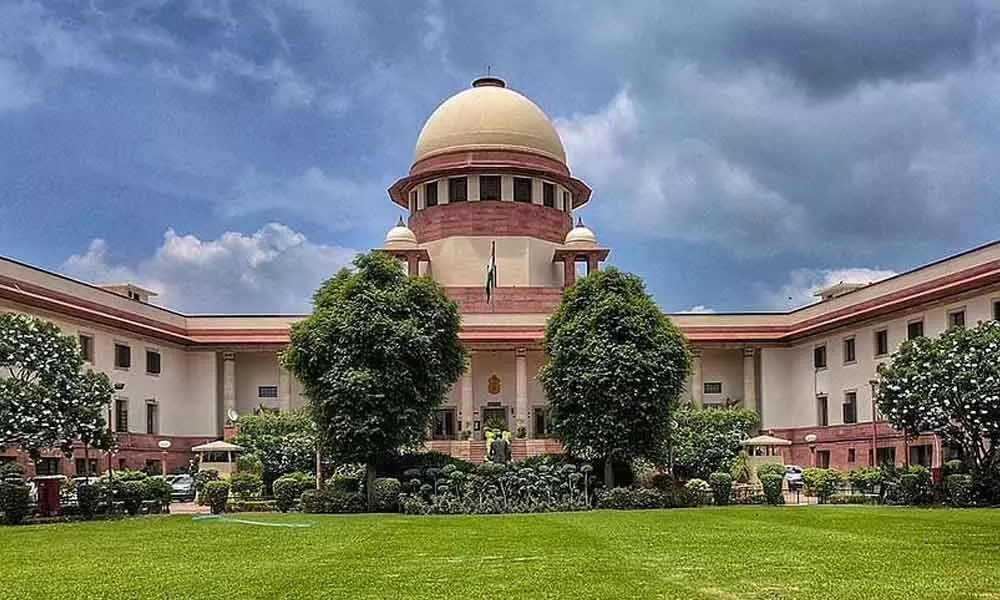Supreme Court panel was against lifting 3 farm laws

Supreme Court
The Supreme Court-appointed panel was not in favour of total repeal of the three controversial farm laws and instead had suggested leaving procurement of crops at a specified price to the states and scrapping of Essential Commodities Act, one of the three members of the panel said on Monday while releasing the committee's report.
New Delhi: The Supreme Court-appointed panel was not in favour of total repeal of the three controversial farm laws and instead had suggested leaving procurement of crops at a specified price to the states and scrapping of Essential Commodities Act, one of the three members of the panel said on Monday while releasing the committee's report.
Pune-based farmer leader Anil Ghanwat said he had on three occasions written to the Supreme Court for releasing the report of the committee but in the absence of a response, he was releasing it on his own. The other two members -- economist Ashok Gulati and agri-economist Pramod Kumar Joshi -- were not present at a hurriedly called press conference here.
The panel had submitted its recommendations on the three farm laws, which among other things, allowed farmers to sell agri produce to private entities outside the government mandis, on March 19, 2021. The three farm laws were repealed by the Modi government in November last year, ahead of assembly elections in Uttar Pradesh and Punjab.
Addressing the press conference, Ghanwat said the committee had also suggested many changes in the laws, including giving freedom to states to make Minimum Support Price (MSP) system legal. The panel had also suggested that the open-ended procurement policy should be discontinued and a model contract agreement should be formulated.
The report has no relevance now as the laws have been repealed but it would help in making policies for the agriculture sector in future, said Ghanwat, who is the President of Swatantra Bharat Party. According to him, the committee has said that a "repeal or a long suspension of these laws would be unfair to the silent majority who support the farm laws."
The panel favoured giving some flexibility in implementation and designs of the laws. The bilateral interactions of the committee with the stakeholders demonstrated that only 13.3 per cent of the stakeholders were not in favour of the three laws. "Around 85.7 per cent of the farmer organisations, representing more than 3.3 crore farmers, supported the laws."
The feedback received through online portal established that around two-thirds of the respondents were in favour of the laws. The feedback received through e-mails also showed that a majority support the laws.
Ghanwat said 40 unions, which had organised agitations against the laws under the banner of Samyukt Kisan Morcha (SKM), did not make any submission despite repeated requests.
On November 19, 2021, Prime Minister Narendra Modi announced the withdrawal of the three farm laws, saying the government could not convince protesting farmers about the benefits of reforms. The repealing of the three farm legislations -- Farmer's Produce Trade and Commerce (Promotion and Facilitation) Act; The Farmers (Empowerment and Protection) Agreement of Price Assurance and Farm Services Act; and The Essential Commodities (Amendment) Act -- was one of the key demands of around 40 farmer unions protesting against these reforms at Delhi borders.
The protest started at the fag-end of November 2020 and ended after Parliament repealed the three laws. The legislations had come into force in June 2020 and were repealed in November 2021. On the farmer unions' demand to legalise the MSP system, the panel said in its report that the demand was not based on sound logic and was infeasible to implement.
"Any product that is produced needs to be traded at a viable price. MSP is an indicative floor price to protect the farmers against any undue fall in prices especially at the time of harvest. The government does not have the financial coffers to buy whatever is produced of all 23 commodities that are currently under the cover of MSP," the report said.
The MSP and procurement support policy, as was designed for cereals during the Green Revolution time, needs to be revisited given that huge surpluses of wheat and rice have emerged. "For wheat and rice, there has to be a cap on procurement which is commensurate to the needs of the Public Distribution System (PDS). The open-ended procurement policy needs to be discontinued as it is distorting the composition of agricultural output in certain states with its adjunct environmental consequences," the report said.
The panel gave few options on how to proceed further looking at least ten years ahead. "One of the options that the committee deliberated upon is to allocate the current expenditure by the central government on procurement, storage and PDS of wheat and rice across states based on an objective formula giving due weightage to production, procurement and poverty. The states should be given the freedom to devise their own approaches to support farmers and protect poor consumers in their respective states," the report said.
The committee recommended that procurement of crops at a declared MSP can be the prerogative of the states as per their specific agricultural policy priorities. "The states can provide for a legal backing for such procurements at their own costs - as the recent Punjab Amendment Act does. Kerala, as an example, has recently announced MSP for fruits and vegetables. Some states also announce bonus on the MSP announced by the Centre," it said.
Another option suggested by the panel was to give freedom of choice to beneficiaries of PDS to choose cash transfers equivalent to MSP + 25 per cent for every kg of grain entitlement or get it in kind (wheat or rice). A concrete road map for gradual diversification from paddy to more sustainable high-value crops, especially in Punjab-Haryana belt, needs to be formulated, the panel said.
Ghanwat said he would soon come out with a discussion paper on agricultural policy and would also organise a rally in Delhi of more than one lakh farmers in October in the national capital to push agri reforms.














